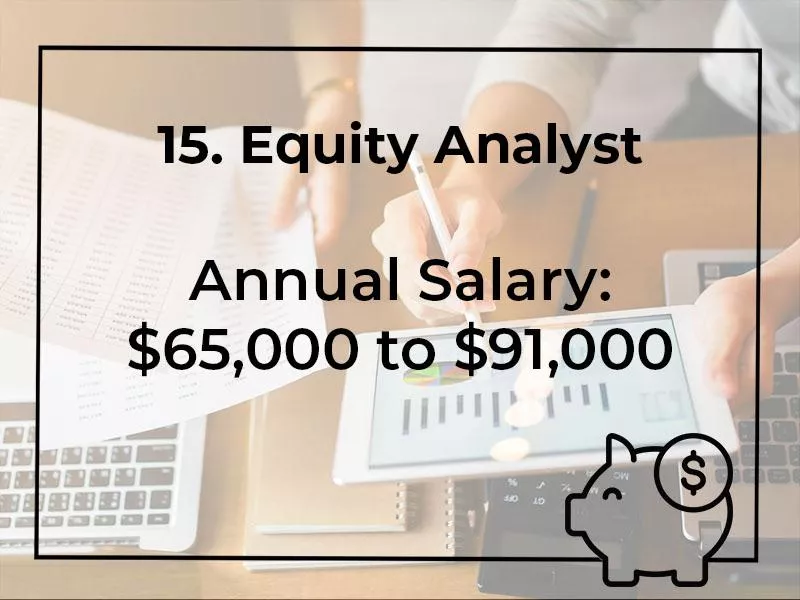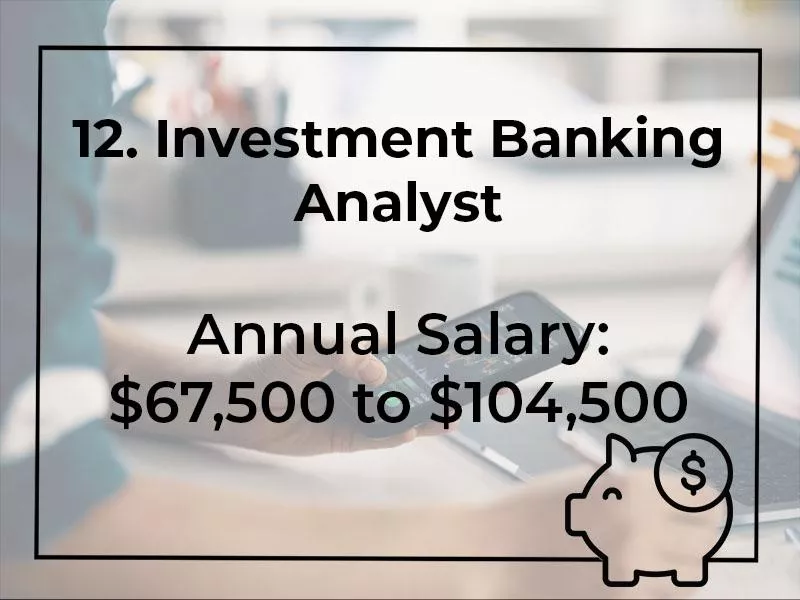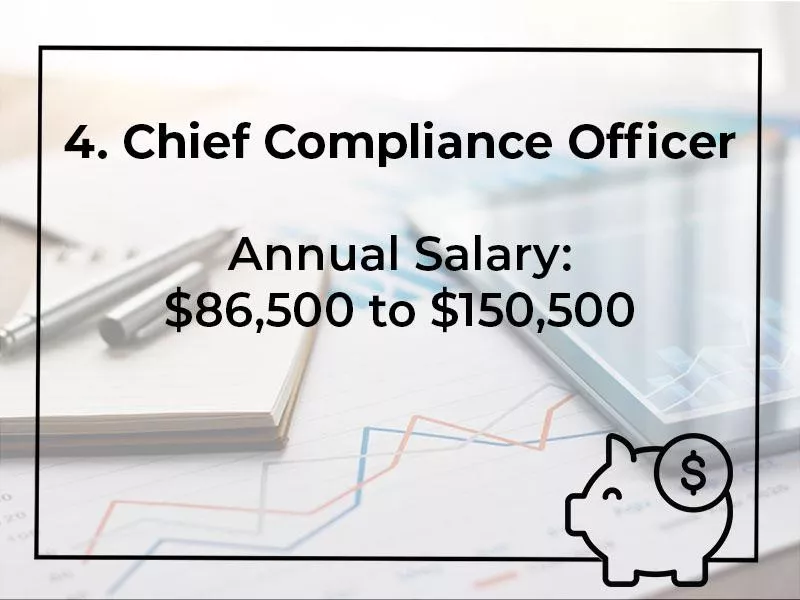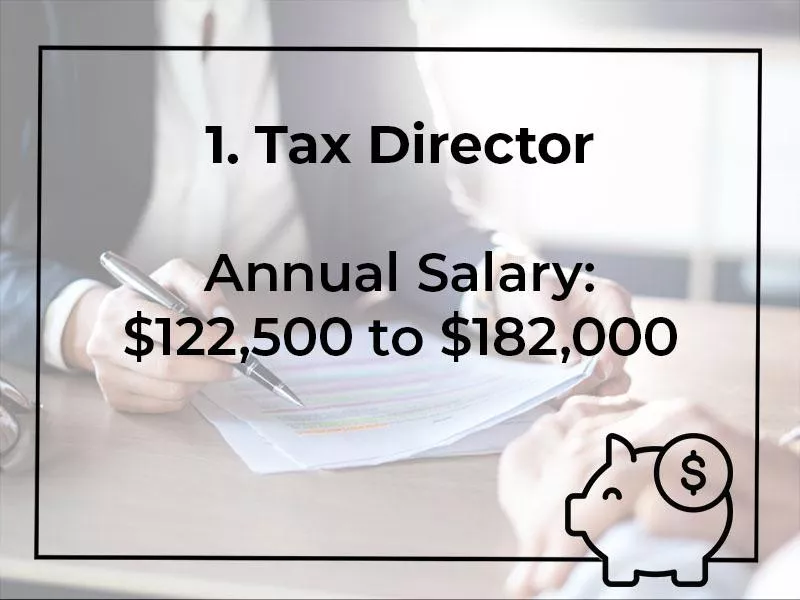Finance industry jobs can be quite lucrative, but if HBO’s “Industry” series has taught us anything, it’s that they’re also a lot of hard work. Most candidates will need several years of experience as well as undergraduate or even graduate degrees (and a whole lot of caffeine) to achieve these positions.
For the best-paying jobs in finance, we based our list on findings from ZipRecruiter. Here’s what you can expect if you’re looking for a job in this sector.
15. Equity Analyst

A person in this role studies the stock market and recommends the proper course of action to their clients. Candidates can be a buy-side or sell-side equity analyst.
Responsibilities include gaining financial market and investment knowledge through observing and researching industry trends and preparing reports with suggestions for buying or selling stocks and funds in a client’s portfolio.
A bachelor’s degree in finance, accounting or economics is a candidate’s best bet for landing this type of job.
Note: This ranking comes from ZipRecruiter’s 2022 report.
14. Loan Officer

A loan officer assesses whether applicants qualify for loans through the underwriting process. The officer collects and verifies the applicant’s financial documents and assesses their need for the loan and their ability to repay it.
Someone seeking a loan officer position can do so with an associate’s or bachelor’s degree and experience in the finance industry; however, should they seek a management position, they should have a master’s. Candidates must also pass the mortgage loan originator (MLO) licensing exam.
13. Hedge Fund Manager

Hedge fund managers can make considerably more than the salary range listed here, depending on how successful they are in the role. Their job is to manage a client’s portfolio of investments to help them decide on how to get the best rate of return. Other skills include monitoring developments in the industry developments and providing reports to their clients.
With few regulations to navigate regarding investments, a hedge fund manager may use more aggressive strategies. Candidates may have a bachelor’s or master’s in accounting, economics, finance or business, and employers typically expect to see at least three years of experience for the position.
12. Investment Banking Analyst

Becoming an investment banking analyst is your best bet at getting your foot in the door of the investment banking industry
Candidate responsibilities include market and industry-specific research, risk and securities analysis, and valuation model construction.
A finance or business degree is a must for this role.
11. IT Auditor

IT auditors focus strictly on the information systems of a company and look for ways to make improvements to them.
They analyze their findings to create or select new systems, build and design software, implement or change policies, or move funding. An IT auditor works with clients internally and externally, handling complaints, providing tech support or collecting feedback on systems and processes.
A bachelor’s in accounting or a related degree is required. Experience is recommended but not mandatory.
10. Finance Manager

Getty Images
You can find finance managers in nearly every industry, as they are responsible for a company’s financial health. While their exact duties are unique to their industry, they generally use analytics, research and reporting tools to create successful strategies for promoting a company’s long-term financial success.
Upper management counts on the recommendations from finance managers to keep a company moving forward on its financial course. Finance managers typically need a bachelor’s degree and five-plus years of experience as an accountant, financial analyst or securities sales agent.
9. Trader

Traders buy and sell assets and instruments, but their specific responsibilities depend on the financial sector they are in. They’ll commonly research and analyze economic factors and day-to-day patterns impacting markets around the world.
A professional trader will navigate a high-stress, highly competitive field — therefore, great communication skills and a cool head are a must. Traders typically have degrees in math, engineering and hard sciences.
8. Investment Banker

The sky is really the limit for what investment bankers can make. A person in this position works in an advisory role, providing the necessary capital market advice to corporations, governments and anyone interested in investments.
Communication is key, as an investment banker frequently advises clients (and buys and sells on their behalf), manages investments and conducts research on them.
While one can become an investment banking analyst immediately after earning a bachelor’s degree, it takes at least two years and a graduate degree to reach associate status at a bank.
7. Private Equity Associate

If you have a desire to work in investment banking, becoming a private equity associate may be your calling.
In this job, you will locate investors, support investments and work with already-existing customers. You may assist a firm in raising their price-earnings (PE) ratio, help them meet performance objectives, work with investors in closing deals and oversee investment products like mutual funds. Your job will also require you to network with possible investors and associates and answer their questions.
Private equity associate candidates need at least a bachelor’s degree in accounting, economics, finance, mathematics or statistics.
6. Credit Risk Manager

A person in this role monitors credit risks for financial institutions by developing credit risk policies and procedures to diminish losses and sustain capital. The credit risk manager will examine data and, from it, create models and performance reports to ensure regulatory compliance and produce credit policy.
Candidates must have a bachelor’s in business administration or a similar field as well as top-notch analytical, communication and research skills. Prior risk management experience is often required in a credit risk management role.
5. Quantitative Analyst

If you’re a real math-minded person, you may want to consider becoming a quantitative analyst. In this job, you’ll use math stats and models for analyzing data to develop solutions for a company and assess any risks.
This job is seen in a wide range of industries, and its duties will vary. Some quants collect data polls and surveys from the public or consumers and use them to improve product design or marketing. Others working in the healthcare industry will work with researchers to test treatments and medical equipment.
It takes only four years to reach this position, but to be a quantitative analyst, you’ll need at least a master’s in finance, economics, math or statistics.
4. Chief Compliance Officer

A CCO ensures a company stays compliant with state and federal laws and legal protocol. They propose and develop compliance programs for the company so that it can remain free of liability and other problems that may cause production disruptions.
A bachelor’s degree in a field related to the industry you’re in is a must; however, some companies may require a graduate degree. It takes a few to gain experience, so you’ll likely work your way up to this role over time.
3. Analytics Director

Bottom line: An analytics director monitors a company’s data analytics and warehousing departments and makes sure their department’s priorities align with those of the company.
Responsibilities include research and development for improving company analytics, team collaboration and senior leadership to improve analytics, keeping capabilities and competencies up and running, and staying on top of the latest industry trends.
At least 10 years of experience in data architecture design, development and business process analysis — are required for the role. A candidate for analytics director must have a master’s in data or computer science.
2. Chief Finance Officer

We won’t kid you — it takes a long time to become a CFO, and this career goal should be planned years in advance, as it takes about 10 to 15 years to secure. Some people have done it in less time, but it is very hard work. A CFO usually has a master’s in finance and several years of experience in management.
A CFO’s main duties are overseeing a corporation’s financial risks, its financial planning and its record-keeping. CFOs monitor a company’s cash flow, liability, partner relationships, shareholder relationship performance, and budget and expenses. They typically oversee a few of the company’s departments, which can include accounting, finance, human resources and IT. The CFO reports directly to the company’s CEO.
1. Tax Director

Tax directors are at the top of the heap when it comes to the best-paying jobs in finance. When a business is in need of a strategic tax plan, it is their job to create and implement one.
When it comes to everyday responsibilities, a tax director will prepare and file tax returns and other documents, including payroll. They will also address any tax issues that come up having to do with the business.
Someone looking to pursue this type of career will need a BA in tax accounting; however, a master’s will increase their odds of candidacy. They may start as a CPA and move up from there.
Experience, leadership skills and command of the written language are also essential for the position. PayScale states that the majority of people in this position — nearly 80 percent — have years behind them than mid-career workers or are in mid-career themselves. In other words, reaching this position can take several years.